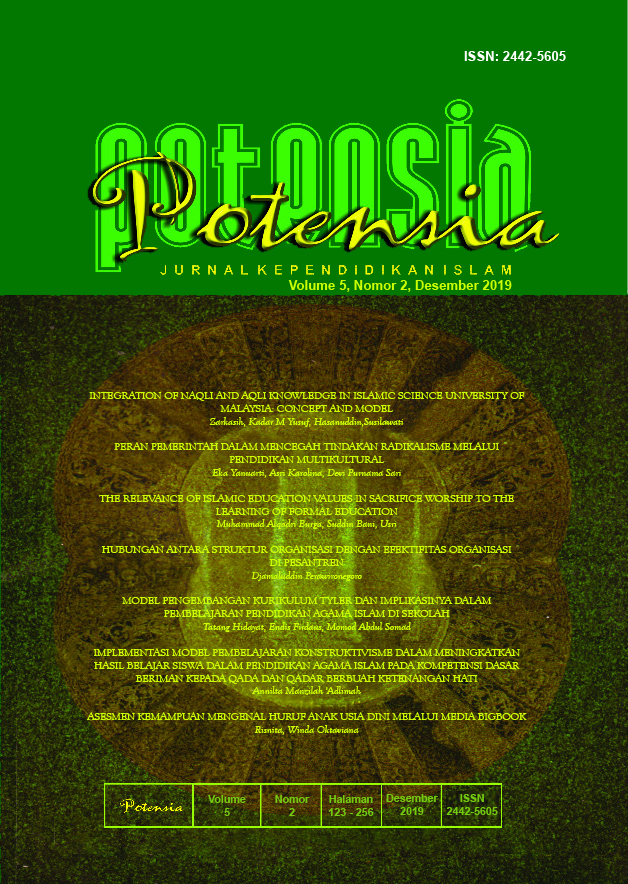PERAN PEMERINTAH DALAM MENCEGAH TINDAKAN RADIKALISME MELALUI PENDIDIKAN MULTIKULTURAL
DOI:
https://doi.org/10.24014/potensia.v5i2.7499Keywords:
government, radicalism, multicultural educationAbstract
This study aims to find out how the role of government in preventing acts of radicalism through the application of multicultural education, this study uses library research. The results of this study indicate that there are 8 roles that can be applied by the government in preventing acts of radicalism through the application of multicultural education, namely first offering various curricula received from input from various groups. Second, providing various facilities so that students know about various cultures, Third, providing understanding of various cultures, Fourth selecting material that causes the emergence of acts of radicalism, Fifth minimizing social equality, Sixth maintaining unity and unity, Seventh supporting peace actions, Eighth participate in socializing in preventing acts of radicalism.References
Ahdar. "TINJAUAN KRITIS DAN MENYELURUH TERHADAP FUNDAMENTALISME DAN RADIKALISME ISLAM MASA KINI," KURIOSITAS: Media Komunikasi Sosial Dan Keagamaan, Vol. 10, No. 1 (2017): 582.
Ambarudin, R. Ibnu, "Pendidikan Multikultural untuk Membangun Bangsa yang Nasionalis Religius." Jurnal Civics: Media Kajian Kewarganegaraan, Vol. 13, No. 1 (2016): 28-45.
Arikunto, Suharsimi. Evaluasi Program Pendidikan. Jakarta: PT Bumi Aksara, 2008.
Asrori, Ahmad. "RADIKALISME DI INDONESIA: Antara Historisitas Dan Antropisitas." KALAM, Vol. 9, No. 2 (2017): 331.
Cahyono, Heri dan Iswati. "URGENSI PENDIDIKAN MULTIKULTURAL SEBAGAI UPAYA MENINGKATKAN APRESIASI SISWA TERHADAP KEARIFAN BUDAYA LOKAL." Elementary: Jurnal Ilmiah Pendidikan Dasar, Vol. 3, No. 1 (2017): 15-29
Dirgantari, Puspo Dewi. "Pengaruh Kualitas Layanan Jasa Pendidikan terhadap Kepuasan Mahasiswa serta Dampaknya terhadap Upaya Peningkatan Citra Perguruan Tinggi Negeri Menuju World Class University (Studi pada Mahasiswa Asing Di ITB, UNPAD, Dan UPI)." JURNAL ILMU MANAJEMEN DAN BISNIS, Vol. 3, No. 2 (2012).
Ibrahim, Ruslan. "Pendidikan Multikultural: Upaya Meminimalisir Konflik Dalam Era Pluralitas Agama." El-Tarbawi, Vol. 1, No. 1 (2008), 115-127.
Idrus, Muhammad. "MUTU PENDIDIKAN DAN PEMERATAAN PENDIDIKAN DI DAERAH." PSIKOPEDAGOGIA Jurnal Bimbingan Dan Konseling, Vol. 1, No. 2 (2012).
M Amirin, Tatang. "Implementasi Pendekatan Pendidikan Multikultural Kontekstual Berbasis Kearifan Lokal Di Indonesia." Jurnal Pembangunan Pendidikan: Fondasi Dan Aplikasi, Vol. 1, No. 1 (2012): 1-16.
Masunah, Juju. "Konsep dan Praktik Pendidikan Multikultural di Amerika Serikat dan Indonesia." Jurnal Ilmu Pendidikan, Vol. 17, No. 4 (2011): 298-306.
Mujahidin. "Pemerataan Pendidikan Anak Bangsa Pendidikan Kapatalisme Pendidikan." Pemerataan Pendidikan Anak Bangsa, 2016.
Munip, Abdul. "Menangkal Radikalisme Agama Di Sekolah." Jurnal Pendidikan Islam, Vol. 1, No. 2 (2012): 159-181.
Muqoyyidin, Andik Wahyun. "Membangun Kesadaran Inklusifmultikultural Untuk Deradikalisasi Pendidikan Islam." Jurnal Pendidikan Islam, Vol. 2, No. 1 (2013): 131-151.
Nuriyanto, Lilam Kadarin. "Bimbingan Konseling Melalui Pendidikan Multikultural terhadap Anak-Anak dan Remaja dalam Penanggulangan Paham Radikalisme." Konseling Religi: Jurnal Bimbingan Konseling Islam, Vol. 5, No. 1 (2014): 19-40.
Rohman, Abdul dan Yenni Eria Ningsih, "Pendidikan Multikultural: Penguatan Identitas Nasional di Era Revolusi Industri 4.0," Prosiding, Seminar Nasional Multidisiplin, UNWAHA Jombang, (2018): 44-50.
Suharsono. "Pendidikan Multikultural." EDUSIANA: Jurnal Manajemen Dan Pendidikan Islam, Vol. 4, No. 1 (2017): 13-23.
Ummah, Sun Choirol. “AKAR RADIKALISME ISLAM DI INDONESIA." Humanika, Kajian Ilmiah Mata Kuliah Umum, Vol. 12, No. 1 (2012): 112-124.
Yanuarti, Eka. "PEMIKIRAN PENDIDIKAN KI. HAJAR DEWANTARA DAN RELEVANSINYA DENGAN KURIKULUM 13." JURNAL PENELITIAN, Vol. 11, No. 2, (2018), 237-266.
Yanuarti, Eka. "Pendidikan Islam Dalam Perspektif Filsafat Idealisme." BELAJEA: Jurnal Pendidikan Islam, Vol. 1, No. 2 (2016): 145-166.
Downloads
Published
How to Cite
Issue
Section
License
POTENSIA: Jurnal Kependidikan Islam operates an Open Access policy under a Creative Commons Attribution 4.0 International License. Authors who publish with this journal agree to the following terms:
- Authors retain copyright and grant the journal right of first publication with the work simultaneously licensed under a Creative Commons Attribution 4.0 International License that allows others to share the work with an acknowledgement of the work's authorship and initial publication in this journal.
- Authors are able to enter into separate, additional contractual arrangements for the non-exclusive distribution of the journal's published version of the work (e.g., post it to an institutional repository or publish it in a book), with an acknowledgement of its initial publication in this journal.
- Authors are permitted and encouraged to post their work online (e.g., in institutional repositories or on their website) prior to and during the submission process, as it can lead to productive exchanges, as well as earlier and greater citation of published work.

